Export to Hydrolix via OpenTelemetry
Send data from APImetrics to Hydrolix with our OpenTelemetry Webhook
Our OpenTelemetry Webhook allows you to send your API traffic to Hydrolix.
Create Hydrolix Webhook
Go to the Alerting section of the sidebar and select Alerts & Webhooks.
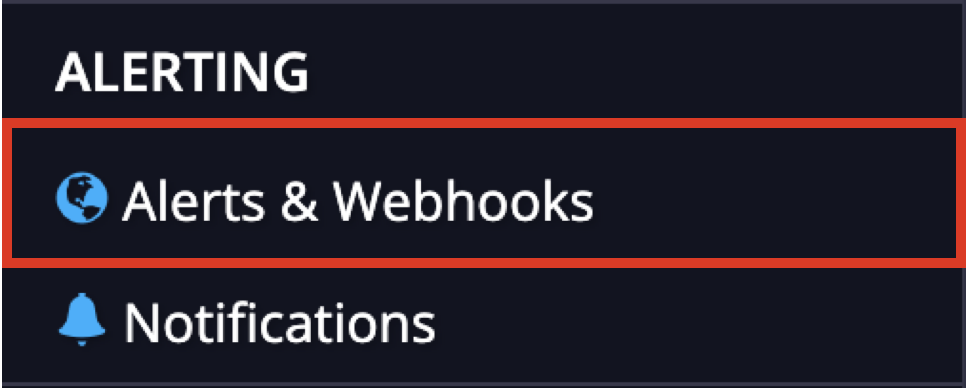
From here, select the Add new alert button.
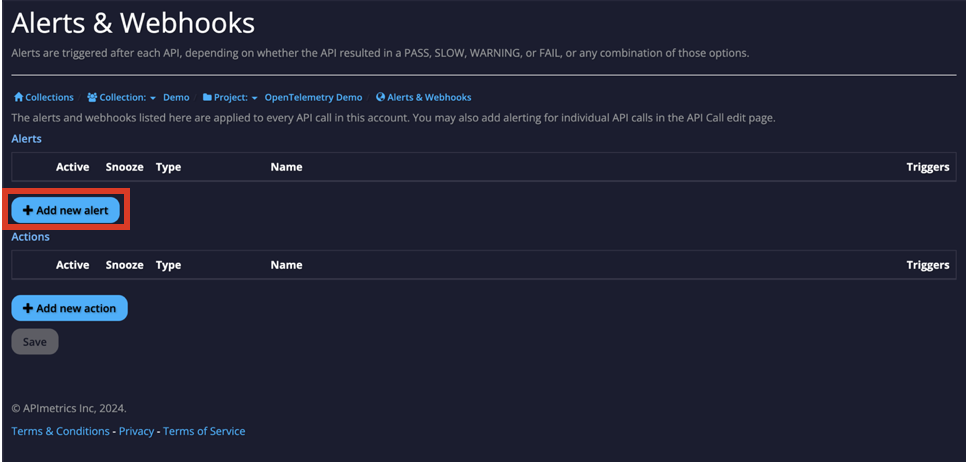
From here, you can name your new alert as Hydrolix and choose the Type as Hydrolix.
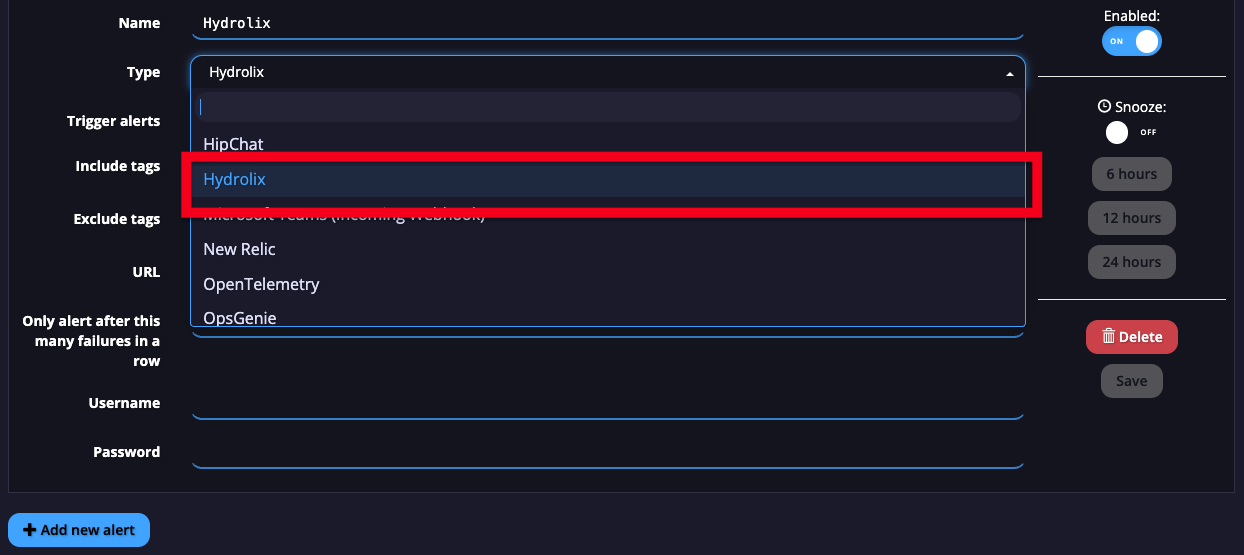
You can now choose which Trigger Alerts and API tags to Include and Exclude from the Webhook. Typically, you will want to include all Trigger Alerts. To finish the setup, you will need to enter your Hydrolix URL as well as the Hydrolix Username and Password.
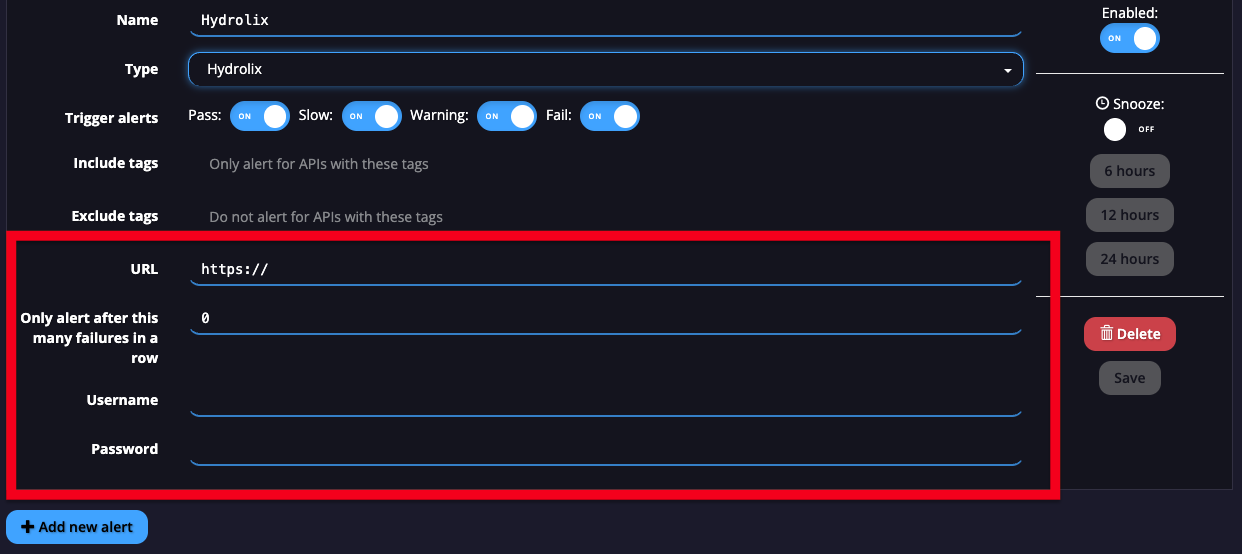
To finalise this Webhook, select the Save button and the Webhook will be finished.
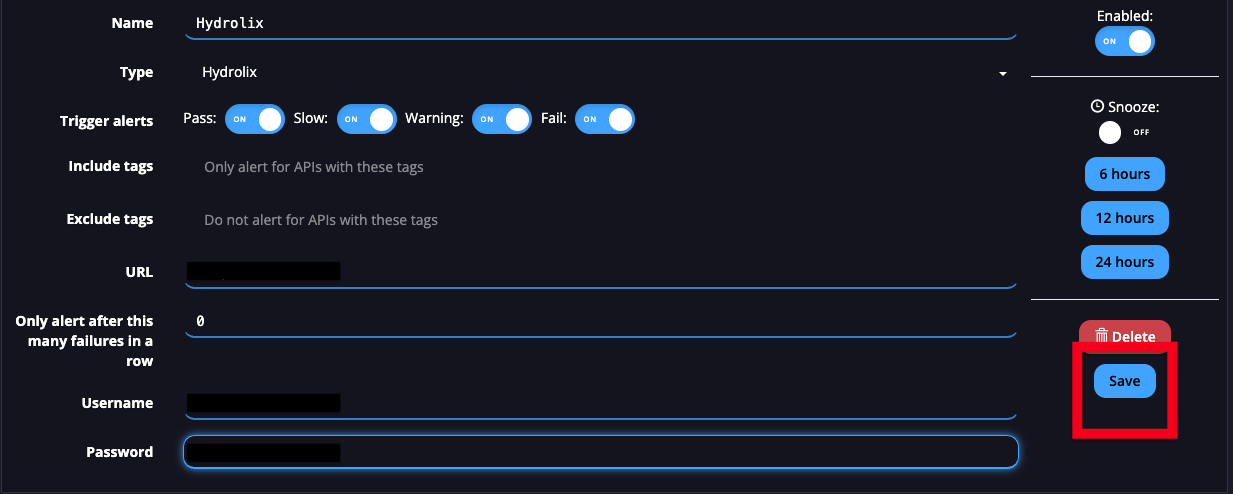
Once saved, monitoring results will be passed to Hydrolix starting from the next test call. Please alert your Hydrolix account team to enable field mapping.
The following fields are transferred to Hydrolix:
- aRecord: A DNS record for the target endpoint that maps its domain name to its corresponding IPv4 address.
- callID: The APIContext identifier for the Call ID - this is a static ID that will be the same every time the call is made. Used for correlating results with the same call parameters.
- callURL: URL link to the APIContext API Call configuration/summary page associated with this API Call.
- city: City from where the call originated, i.e. the location of the APIContext agent.
- cloud: Name of the cloud provider from where the call originated, i.e. the location of the APIContext agent.
- cnameRecord: A DNS record for the target endpoint that maps its domain name to another domain name, effectively aliasing the domain called to another domain.
- connect: The number of milliseconds (ms) to complete the network connection.
- contextOwners: APIContext internal reference field used for analysis and de-bugging only.
- contextReferences: APIContext internal reference field used for analysis and de-bugging only.
- contextViewed: APIContext internal reference field used for analysis and de-bugging only.
- continent: Continent where the API call originated, i.e. the location of the APIContext agent.
- country: Country where the API call originated, i.e. the location of the APIContext agent.
- Dns: The number of milliseconds (ms) it took for the DNS lookup.
- download: The number of milliseconds (ms) the response download took to complete.
- httpCode: The http response code.
- 1xx informational response – the request was received, continuing process
- 2xx successful – the request was successfully received, understood, and accepted
- 3xx redirection – further action needs to be taken in order to complete the request
- 4xx client error – the request contains bad syntax or cannot be fulfilled
- 5xx server error – the server failed to fulfil an apparently valid request
- httpReason: A brief description or phrase associated with an HTTP status code, explaining the reason for the response (e.g., "OK" for a 200 code).
- ipAddr: The IP address where the API call originated, i.e. the location of the APIContext agent.
- latitude: The geographic latitude where the API call originated, i.e. the location of the APIContext agent.
- locationID: Unique identifier of the APIContext agent location - e.g. apimetrics_azurenorwayeast.
- longitude: The geographic longitude where the API call originated, i.e. the location of the APIContext agent.
- metadataDescription: A textual description providing more information about a specific API call - this is set during call configuration.
- metadataDomain: The domain name of the APIContext API call - this is set during call configuration.
- metadataName: The name of the APIContext API call - this is set during call configuration.
- metadataTags: A list of tags associated with the APIConext API Call - this is set during call configuration.
- nsRecord: A DNS record that specifies the name servers responsible for a particular API Call.
processing: The number of milliseconds (ms) the endpoint server took to process the request. - otelTraceparentID: A unique identifier that matches the 'traceParent' header sent in the request. Use this to map the call to your own server logs.
- projectMetaName: The APIContext project name where the call configuration can be found.
- projectMetaOrg: The APIContext organization name where the project can be found.
- projectMetaTags: A list of tags associated with the Project - this is set during project configuration.
region: The region where the API call originated, i.e. the location of the APIContext agent. E.g. ‘Oslo’, ‘Dublin’ - responseSize: The size of the response data returned from a request, measured in bytes.
- responseTime: The number of milliseconds (ms) the response took to fully download.
- resultClass: The result of the test:
- PASS: Indicates the call has returned a response code that indicates a PASS condition. Usually, this indicates a 2xx response, but can be set during alert configuration.
- SLOW: Indicates the call has returned a response code that indicates a slow response. The expected response time can be set during alert configuration.
- FAIL: Indicates the call has returned a response code that indicates a FAIL condition. Usually, this indicates a 4xx or 5xx response, but can be set during alert configuration.
- result: The specific status explaining the reason for resultClass in more detail, e.g. ‘Complete’, ‘Skipped’, ‘SLA Warning’, etc.
- resultID: A unique identifier assigned to a specific result. This will be unique for every call.
- resultURL: This is the URL link that takes you to the APIContext API Results page for this single request.
- startTime: The timestamp when the call was instantiated.
- targetAsn: The Autonomous System Number (ASN) associated with the target endpoint.
- targetCdn: The content delivery network associated with the target endpoint - e.g. CloudFlare, Akamai.
- targetCity: The city where the target endpoint is geographically located.
- targetCloud: The cloud service provider where the target endpoint is located.
- targetContinent: The continent where the target endpoint resides.
- targetCountry: The country where the target endpoint or network is geographically located.
- targetIPAddr: The IP address of the target endpoint.
- targetLatitude: The geographic latitude of the target endpoint.
- targetLongitude: The geographic longitude of the target endpoint.
- targetNetwork: The network associated with the target endpoint - e.g. CloudFlare, Akamai.
- targetRegion: The geographic region where the target endpoint is located. E.g. ‘Oslo’, ‘Dublin’
- tlsHandshake: The number of milliseconds (ms) to complete the network connection.
- total: The number of milliseconds (ms) from the initial request until the response is fully downloaded.
- upload: The number of milliseconds (ms) the request took to upload to the endpoint server.
- workflowId: The APIContext workflow ID associated with the request. Please note this will be empty if the request is not part of a workflow.
- workflowName: The name of the workflow associated with the request. Please note this will be empty if the request is not part of a workflow.
- workflowResultId: A unique identifier for the result of a specific APIContext workflow execution. Please note this will be empty if the request is not part of a workflow.
- workflowResultUrl: A URL linking to the APIContext workflow result page for the workflow associated with the request. Please note this will be empty if the request is not part of a workflow.
- workflowUrl: A URL pointing to the workflow configuration/summary page. Please note this will be empty if the request is not part of a workflow.
Updated 5 months ago